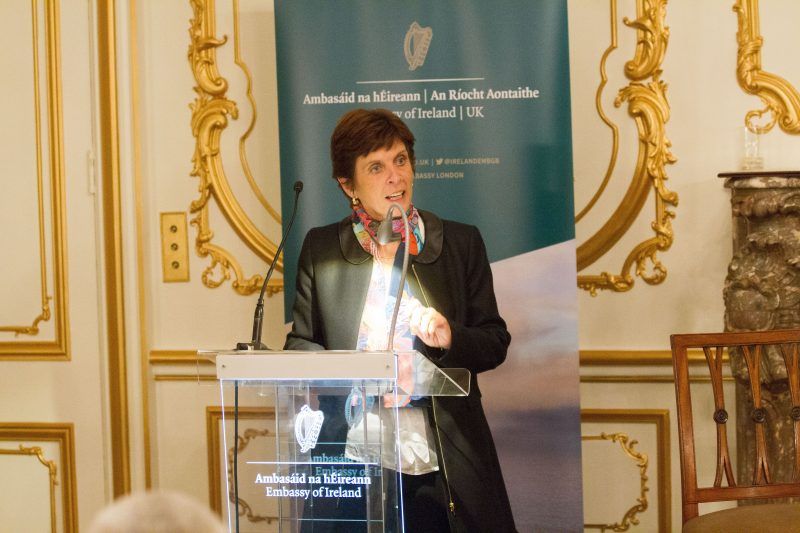Professor Louise Richardson Vice-Chancellor of the University of Oxford gives Henry Grattan lecture
Posted on: 17 December 2019
Professor Louise Richardson, Vice-Chancellor of the University of Oxford spoke about the power of words in politics and the relationship between Britain and Ireland.The lecture titled “Speaking to the Hand: the Rhetoric of Division and the Threat to Democracy” was hosted by the Embassy of Ireland in London in association with Trinity College Dublin.
The Henry Grattan Lecture forms part of an annual lecture series and flagship initiative of the School of Social Sciences and Philosophy at Trinity College Dublin. Ambassador of Ireland to Britain, Adrian O’Neill, opened proceedings, and Head of School and Professor in Economics, Carol Newman was in the chair.

In the course of her talk, Professor Richardson reflected on how distinguished Trinity graduates such as Henry Grattan sought to affect change through words:
“Rhetoric in its capacity to interrogate our assumptions, to unite us in sympathy with strangers, to inspire us to do better by one another, can actually be a deeply moral art. Ireland has produced more than her fair share of great speakers, among them Henry Grattan himself, and Edmund Burke and Daniel O’Connell. They were internationalists. They extrapolated the experience of Ireland under colonial rule. The rhetoric was sometimes accusatory, sometimes limited by their experience and their assumptions, but it was not small-minded. It was big-hearted, looking consistently outward with curiosity and a sense of responsibility to others.”
According to Professor Richardson causes of the diminution of rhetoric in public life include the difficulty in identifying trust with confidence and the impact of social media. Fake news spreads quickly and destructively, and foreign money used for political advertising is influencing the democratic process. Social media is also changing the way political leaders communicate with reasoned debate discouraged in favour of simplistic thinking.
“Once politicians had to speak in an open forum because they did not know with certainty where their potential voters lay. They were obliged to explain and to contest ideas in long-form debates, speeches on the hustings and searching media briefings. Modern public experience of politics is highly visual, and is far more limited to soundbites. Bottom thinking, manipulation of key facts and suppression of inconvenient truths all become easier to hide when there is no regular, detailed scrutiny of political leaders’ policies.”
The Oxford Vice-Chancellor also highlighted how in recent years, internationalism has become a concept denigrated by many politicians which encompassed a much narrower sense of identity, founded by new laws and reinforced by new borders.
“I see no conflict between patriotism and internationalism. The turn inward is a fearful movement of contraction. It suggests that our problems arrive from those from other places who desire to take these things that we hold dear. In truth, of course, national problems, much like family problems, are usually a product of our internal dynamics as much as external forces: how we share or don’t share our resources, who mistrusts whom, and how resilient we are by facing change.”
Few places demonstrate the benefits of globalism better than Ireland. In the first decades of independence, the Republican of Ireland did indeed turn inward and the country suffered both culturally and economically. It managed to stay connected to the rest of the world only through the mass migration of its population. It was only in 1958 and most decidedly, after 1973, upon entering the EEC that Ireland became fully engaged internationally. As a result, the Republic began to thrive both socially and economically, and built the resilience to withstand the difficulties of the troubles of Northern Ireland, the heady heights of the Celtic Tiger, as well as the lows of the financial crash. Ireland has prospered by rejecting the inward-looking policies of the past.”
On Brexit, Prof Richardson emphasised that while there is a real risk of losing the precious fruit of a delicate long-term international peace process, Ireland could not only escape the effects of the power struggles that have polarized and paralyzed British politics in the last few years, but she could learn from them and reject the rhetoric of division.
“We can continue to embrace the rhetoric of inclusiveness. Men like Grattan, O’Connell and Burke were of other times. It’s hard to know what they would make of Ireland today, but when I see countries in the world turning inward and Ireland resolutely turning outward, I take enormous pride in the legacy of the political discourse that they have left us.”

